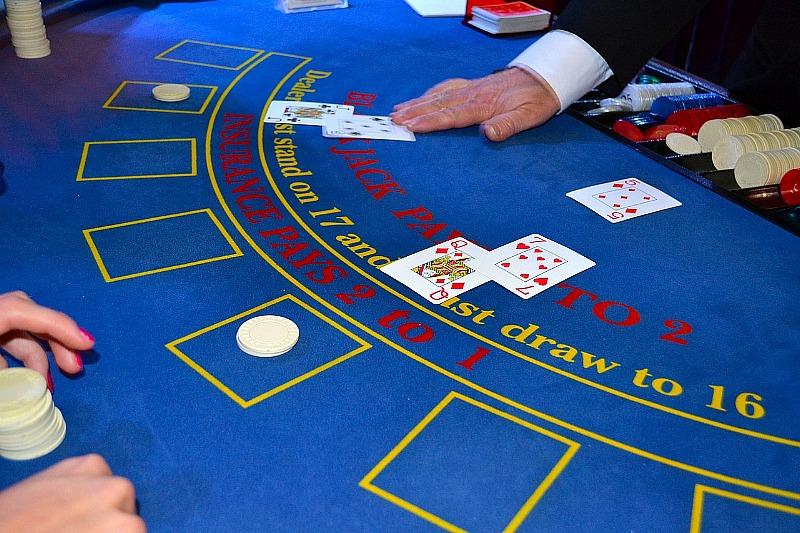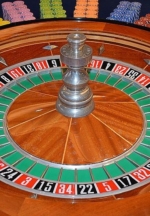
1: Set a Budget
Setting a budget means determining in advance the amount of money you are willing to spend for a session at the casino. This amount should be money you can afford to lose without affecting your daily life. The budget acts as a financial boundary to prevent overspending and to help manage the inherent risk of gambling.
The significance of setting a budget lies in its ability to foster responsible gambling habits. It serves as a protective measure against the potential financial harm that can come from gambling, such as accruing debt or using funds meant for essential expenses. By adhering to a predetermined budget, players can enjoy the entertainment aspect of gambling without the stress of financial strain. It also encourages discipline and self-control, which are crucial traits for anyone engaging in activities with elements of risk.
Example : Suppose you plan a visit to the casino with a budget of $200. This is money you’ve saved specifically for entertainment, separate from your bills and savings. Regardless of whether you’re winning or losing, you decide that once this $200 is spent, you’ll stop playing for the day. This approach ensures that your casino visit remains a leisure activity and doesn’t negatively impact your financial health.
Our advice : Professionals in the field of gambling and financial management strongly advise against using credit cards or borrowing money to gamble. They recommend only using discretionary income for gambling activities. Furthermore, it’s wise to keep a record of your spending to maintain awareness of your financial habits. Financial advisors might suggest setting aside a small portion of your discretionary income each month into a “fun fund,” which can be used for activities like gambling, thus ensuring that you’re only spending what you can afford to lose without compromising your financial security.
2: Know When to Quit
Knowing when to quit involves setting clear limits on your wins and losses before you start gambling. This strategy is about recognizing the right moment to walk away based on your initial budget and the goals you’ve set. It’s about balancing the desire to win more with the risk of losing what you’ve already won or spending beyond your means.
This principle is critical for several reasons. Firstly, it helps in preserving your winnings. The nature of gambling means that the odds are always in the house’s favor over the long term; the longer you play, the more likely you are to lose. Secondly, it prevents minor losses from escalating into significant financial problems. By quitting while you’re ahead or stopping before you exceed your loss limit, you ensure that gambling remains a leisure activity and does not adversely affect your financial stability or emotional well-being.
Example : Imagine you start your casino night with a $200 budget and decide beforehand that you’ll stop if you either double your money or lose the entire budget. If, at some point, your winnings reach $400, you stick to your plan and quit, securing your profits. Alternatively, if you lose the $200, you also quit to prevent further losses, adhering to your predetermined loss limit.
Our Advice: Gambling experts and psychologists often recommend setting both positive (win) and negative (loss) financial boundaries. They also suggest implementing time limits to prevent long sessions that can lead to fatigue and impaired decision-making. A good practice is to take a moment to reflect on your emotional state and overall enjoyment of the game, asking yourself whether continuing to play is truly for entertainment or an attempt to chase losses. Financial advisors might also recommend leaving your credit and debit cards at home when visiting a casino, bringing only the cash amount you’ve allocated for gambling to enforce your spending limit physically.
3: Practice Bankroll Management
Bankroll management involves allocating your gambling budget in a way that maximizes your playing time and enjoyment while minimizing potential losses. It’s about deciding not just how much you’re willing to spend overall, but also how much you’re willing to stake on each bet or game session. This strategy requires you to adjust your bet sizes based on your total budget, ideally so that you can withstand a series of losses without depleting your bankroll too quickly.
Effective bankroll management is crucial because it helps you to stay in the game longer, giving you more opportunities to win. It also protects you from the potential harm of rapidly losing money, which can lead to chasing losses or gambling with funds you cannot afford to lose. By carefully managing your bankroll, you ensure that gambling remains a pleasurable activity and doesn’t turn into a financial burden. It encourages responsible gambling and provides a safety net that can help prevent the development of problematic gambling behaviors.
Example : Suppose you have a $200 budget for a casino visit. Instead of betting $50 on a single game, which could quickly exhaust your funds with a few losses, you decide to limit your bets to $5 per game. This approach means you can play at least 40 rounds, giving you more chances to win and ensuring that you’ll enjoy a longer period of entertainment, regardless of individual game outcomes.
Our Advice: Gambling professionals and financial advisors often recommend that you never stake more than 1-2% of your total bankroll on a single bet. This conservative approach ensures that no single loss can significantly impact your overall budget. They also suggest adjusting your bet size if your bankroll increases or decreases substantially, maintaining the same prudent percentage relative to your current funds. Additionally, it’s wise to separate your gambling bankroll from your other finances, using a dedicated account or cash envelope for this purpose, to avoid the temptation of dipping into money reserved for essential expenses.
4: Choose Games with Better Odds
Choosing games with better odds means selecting casino games that offer a higher probability of winning or a lower house edge. The house edge is the statistical advantage the casino has over players. Games like Blackjack, Craps, and certain bets in Roulette have a lower house edge, increasing the player’s chances of winning compared to slot machines or Keno, which typically have higher house edges.
Understanding and selecting games with better odds is crucial because it directly impacts your potential for winning and how long your money will last. Playing games with a lower house edge increases your chances of making a profit or at least ensures that you can play for longer periods without depleting your bankroll too quickly. It’s about making informed choices that enhance your entertainment value and potential return on investment.
Example: Consider Blackjack, which, with the application of basic strategy, can reduce the house edge to below 1%. This means that for every $100 wagered, you might expect to lose less than $1 over the long term, compared to playing slot machines where the house edge can be as high as 10% or more, leading to an expected loss of $10 or more per $100 wagered.
Our Advice: Gambling experts often recommend taking the time to learn the rules and strategies of games with better odds. For instance, mastering basic strategy in Blackjack or understanding the best bets to make in Craps can significantly reduce the house edge. They also suggest playing games where your skill can influence the outcome, as this gives you more control over your potential success.
5: Learn Game Strategies
Learning game strategies involves understanding the rules, odds, and best practices for casino games to maximize your chances of winning. This not only includes knowing the basic mechanics of a game but also studying advanced strategies that can decrease the house edge or increase your odds of winning. Games like Blackjack, Poker, and certain types of video poker allow for strategic play that can significantly influence the outcome.
The significance of learning and applying game strategies cannot be overstated. While all casino games have an inherent house edge, applying strategy can minimize this advantage and give you a better chance of winning. For games of skill, like Poker and Blackjack, mastering strategy can even give you an edge over less knowledgeable players. Understanding game strategies enhances your gambling experience by making you a more competent and confident player, and it can also increase your enjoyment of the game by adding a layer of depth and engagement to your play.
Example: In Blackjack, employing basic strategy—such as when to hit, stand, double down, or split—can reduce the house edge to as low as 0.5%. This means that over time, you are more likely to retain more of your bankroll, extending your playtime and increasing your chances of winning. Similarly, in Poker, knowing when to fold, call, or raise based on the strength of your hand and the betting patterns of your opponents can significantly impact your success.
Our Advice: Experts recommend starting with the basics of game strategies and gradually moving to more complex concepts. Many online resources, books, and even casino-sponsored classes can teach you the strategies for your chosen game. Practicing these strategies through free online games, apps, or with friends can help solidify your understanding without risking real money.
6: Avoid Chasing Losses
Chasing losses refers to the behavior of increasing bets or continuing to play in an attempt to recoup previous losses. It often occurs when a player experiences a losing streak and becomes emotionally invested in recovering their losses rather than making rational decisions based on their remaining bankroll and the odds of winning. Chasing losses can lead to further financial losses, emotional distress, and a cycle of compulsive gambling behavior.
Avoiding the trap of chasing losses is crucial for maintaining control over your gambling activities and preventing significant financial harm. Continuously increasing bets or playing longer than planned in an attempt to recover losses rarely results in success and often exacerbates the problem. It can lead to reckless behavior, irrational decision-making, and a negative spiral of mounting losses. By recognizing and resisting the urge to chase losses, you protect yourself from the potential consequences of problem gambling and preserve your financial well-being.
Example: Imagine you enter a casino with a $200 budget and lose $100 within the first hour of play. Instead of accepting the loss and sticking to your budget, you become determined to win back the $100 you’ve lost. You start increasing your bets, playing riskier games, and extending your session in the hope of turning things around. However, despite your efforts, you continue to lose money and eventually deplete your entire budget, compounding your initial loss.
Professional Advice: Gambling experts and counselors often stress the importance of setting loss limits and sticking to them. They recommend accepting losses as a natural part of gambling and avoiding the emotional temptation to chase them. Developing healthy coping mechanisms for dealing with losses, such as taking a break, seeking support from friends or professionals, or engaging in alternative activities, can help mitigate the urge to chase losses.
7: Take Advantage of Bonuses and Promotions
Casinos often offer bonuses and promotions to attract and retain players. These can include welcome bonuses, free spins, loyalty rewards, and cashback offers. Taking advantage of these offers can provide you with extra playing money, free bets, or opportunities to win without having to spend more of your own money. Many online platforms like Casinorange offer these incentives to new players, providing a risk-free opportunity to practice and develop your strategies. However, it’s crucial to understand the terms and conditions associated with these bonuses, such as wagering requirements, game restrictions, and expiration dates.
Utilizing bonuses and promotions is important because it can significantly extend your playtime and increase your chances of winning without requiring additional investment. These offers can lower the effective house edge on your bets or give you free chances to win real money. Smart use of bonuses can be a strategic component of gambling, allowing you to maximize your entertainment value while minimizing risk.
Example: A casino offers a 100% match bonus on your first deposit up to $200 with a 30x wagering requirement. If you deposit $200, you’ll have $400 to play with. By choosing games with a low house edge and applying proper strategies, you can fulfill the wagering requirement and potentially come out ahead, using the bonus funds.
Our Advice: Gambling experts recommend carefully reading the terms and conditions of any bonus or promotion to ensure it offers real value. Look for bonuses with low wagering requirements and those that allow you to play games with a high Return to Player (RTP) percentage. It’s also wise to manage bonuses strategically; for instance, using free spins on slots with high RTPs or applying match bonuses to games where you can employ effective strategies.
8: Take Breaks
Taking regular breaks during gambling sessions is about consciously stepping away from the game for a period. This can involve physically moving away from the gambling area, engaging in a different activity, or simply taking a moment to relax and clear your mind. Breaks can help reset your mental state, reduce the intensity of emotions associated with gambling, and give you time to reassess your current situation regarding wins, losses, and overall strategy.
The importance of taking breaks lies in their ability to help maintain control over your gambling behavior. Continuous gambling can lead to fatigue, which impairs judgment and decision-making abilities, making it easier to make mistakes or poor choices. Breaks help mitigate this risk by allowing you to step back, refresh, and make more deliberate decisions. They also provide an opportunity to check in with yourself about whether you’re still enjoying the activity and adhering to your pre-set limits.
Example: Imagine you’ve been playing slots for a couple of hours and find yourself getting frustrated over a lack of wins. Instead of continuing to play in an attempt to change your luck, you decide to take a 30-minute break. You leave the casino floor, grab a coffee, and take a walk outside. This break gives you the chance to cool off, reflect on your budget, and decide whether you want to continue playing or call it a day.
Our Advice: Gambling experts recommend setting alarms or reminders as a prompt to take breaks at regular intervals, such as every hour. They also suggest having a plan for your break activities, whether it’s a meal, a walk, or a chat with a friend, to ensure that you’re genuinely stepping away from the gambling mindset.
9: Play Progressive Jackpot Games
Progressive jackpot games are casino games where the jackpot increases incrementally as players make bets. A portion of each bet contributes to the jackpot, which continues to grow until it is won. These games often include slot machines, video poker, and certain table games. The appeal of progressive jackpot games lies in the potential for massive payouts that can change a player’s life in an instant.
Playing progressive jackpot games offers the allure of striking it rich with a single spin or hand. While the odds of winning these jackpots are typically much lower than regular casino games, the potential rewards are exponentially higher. For some players, the excitement of chasing a life-changing jackpot adds an extra layer of thrill to their gambling experience. Additionally, winning a progressive jackpot can provide a significant financial boost and create memorable moments that enhance the overall enjoyment of casino gambling.
Example: A popular example of a progressive jackpot game is the slot machine “Mega Moolah.” This game features multiple progressive jackpots, including a top prize known for reaching multi-million-dollar amounts. Each time a player spins the reels, a small portion of their bet contributes to the jackpot, causing it to grow until someone hits the winning combination and claims the prize.
Our Advice: Gambling professionals advise players to approach progressive jackpot games with caution and moderation. While the potential payouts can be enticing, it’s essential to remember that winning these jackpots is rare and largely based on luck. Therefore, it’s crucial to set a budget specifically for playing progressive jackpot games and not to chase losses or overspend in pursuit of the jackpot. It’s also recommended to read the rules and terms of each progressive jackpot game to understand the betting requirements and odds of winning.
10: Use Free Play to Your Advantage
Free play refers to the opportunity to play casino games without wagering real money. Many online casinos and even some land-based establishments offer versions of their games that can be played for free. This can include slots, table games, and sometimes even advanced games like poker. Utilizing free play allows you to familiarize yourself with the rules, features, and strategies of various games without any financial risk. It’s an excellent way to practice and improve your understanding and skills in a pressure-free environment.
The importance of using free play lies in its role as a risk-free learning tool. It provides a practical and direct way to apply game strategies, understand the mechanics of new games, and refine your skills without the stress of losing money. For beginners, it’s an invaluable way to gain confidence and competence in games. For more experienced gamblers, it offers a means to test out new strategies or get accustomed to variations of games they might not have tried before.
Example: Suppose you’re interested in learning how to play Blackjack but have little to no experience. By using the free play option at an online casino, you can play hundreds of hands without spending a dime, learning how the game works, and practicing basic strategy. This approach not only enhances your understanding of the game but also prepares you for playing with real money, potentially improving your chances of winning.
Our Advice: Experts often recommend starting with free play when trying out a new game or when looking to master a particular strategy. They advise setting realistic goals for what you want to achieve during these sessions, such as understanding all the bet types in craps or being able to quickly calculate pot odds in poker.
Advantages and disadvantages
| Pros | Cons | |
| Set a Budget | – Ensures responsible gambling | – Limits potential for larger winnings |
| Know When to Quit | – Preserves winnings and prevents excessive losses | – May miss out on potential comeback |
| Practice Bankroll Management | – Allows for extended playtime and enjoyment | – Requires discipline to stick to the budget |
| Choose Games with Better Odds | – Increases chances of winning | – May not offer the same level of excitement as riskier games |
| Learn Game Strategies | – Improves win rate through informed decision-making | – Requires time and effort to learn and master strategies |
| Avoid Chasing Losses | – Prevents further financial losses | – Can lead to frustration and impulse decisions |
| Take Advantage of Bonuses and Promotions | – Extends playtime and increases chances of winning | – Often come with wagering requirements or restrictions |
| Take Breaks | – Helps maintain focus and make rational decisions | – Interrupts gameplay, potentially missing out on opportunities |
| Play Progressive Jackpot Games | – Offers potential for large payouts | – Lower odds of winning compared to other games |
| Use Free Play to Your Advantage | – Allows for learning and practicing without financial risk | – Does not directly contribute to winning real money |



















